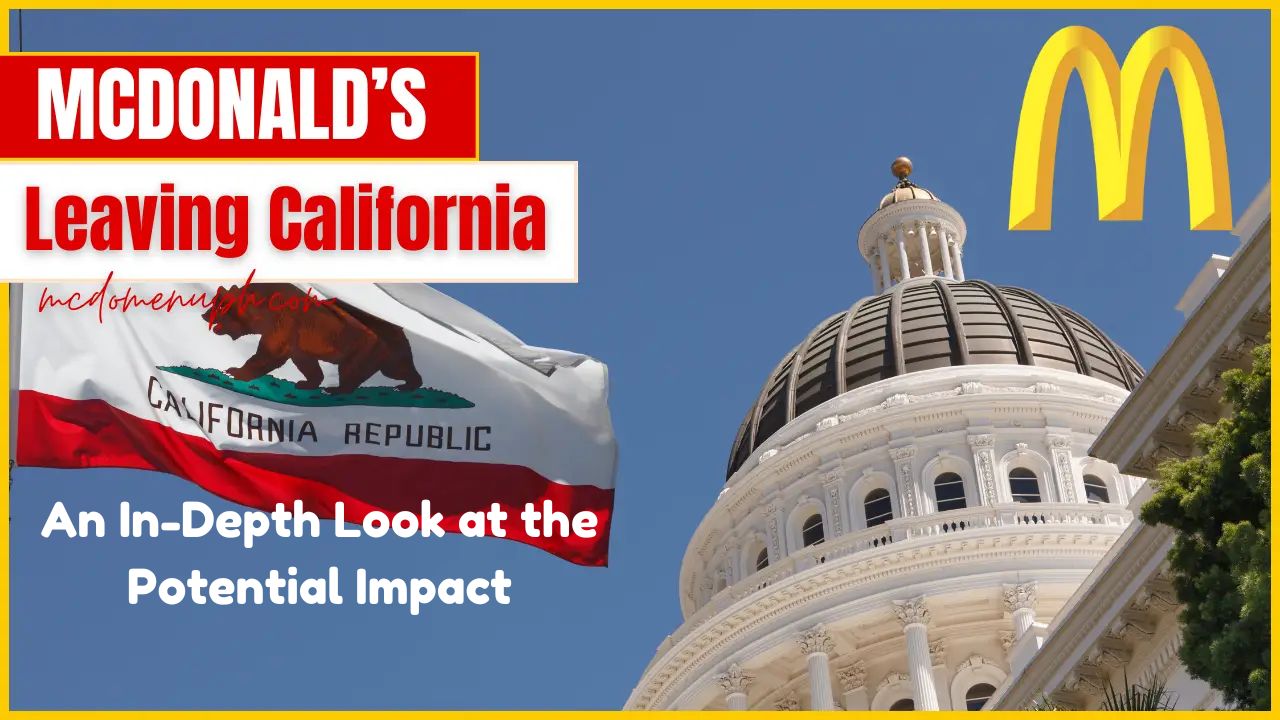Introduction
The recent buzz around McDonald’s possibly leaving California has stirred a mix of concern, speculation, and debate among residents, business analysts, and fast-food enthusiasts. McDonald’s, a global fast-food giant, has been a staple in California since it opened its doors in the state decades ago. This article will explore the reasons behind the rumors, the potential impact on California’s economy, and the broader implications for the fast-food industry.
The Origin of the Rumors
Rumors of McDonald’s leaving California started circulating due to a combination of factors. These include increasing operational costs, regulatory challenges, and changes in consumer behavior. The speculation gained momentum when several media outlets reported on McDonald’s struggles with the state’s stringent labor laws and environmental regulations.
- Operational Costs: California’s high minimum wage and stringent labor laws have significantly increased the cost of running fast-food restaurants. For a company like McDonald’s, which operates on thin margins, these costs can be particularly burdensome.
- Regulatory Challenges: California is known for its rigorous environmental and health regulations. While these laws are aimed at protecting consumers and the environment, they also add to the operational complexities for businesses. McDonald’s, with its extensive supply chain and numerous outlets, faces significant compliance costs.
- Consumer Behavior: There has been a noticeable shift in consumer preferences towards healthier and more sustainable food options. This change is especially pronounced in California, where there is a strong emphasis on health and wellness. McDonald’s has been trying to adapt to these changes, but the transition is challenging and costly.
The Potential Impact on California’s Economy
If McDonald’s were to leave California, the impact on the state’s economy could be significant. Here are some of the potential consequences:
- Job Losses: McDonald’s employs thousands of people across its numerous outlets in California. The closure of these restaurants would result in substantial job losses, affecting not only the employees but also their families and communities.
- Economic Ripple Effect: McDonald’s is part of a larger ecosystem that includes suppliers, delivery services, and other ancillary businesses. The departure of McDonald’s could lead to a ripple effect, impacting various sectors of the economy.
- Tax Revenue: McDonald’s contributes significantly to the state’s tax revenue. The loss of this revenue could affect public services and infrastructure projects funded by these taxes.
- Real Estate Impact: McDonald’s outlets occupy prime real estate locations across California. The closure of these restaurants could lead to vacant properties and affect the real estate market.
The Broader Implications for the Fast-Food Industry

McDonald’s leaving California could set a precedent for other fast-food chains facing similar challenges. Here’s how it might influence the industry:
- Industry Re-evaluation: Other fast-food chains might re-evaluate their operations in states with high regulatory and operational costs. This could lead to a shift in the industry’s geographic focus.
- Innovation and Adaptation: The challenges faced by McDonald’s could drive innovation in the fast-food industry. Companies may invest more in technology and automation to reduce costs and comply with regulations.
- Health and Sustainability Trends: The industry might accelerate its efforts to adapt to changing consumer preferences for healthier and more sustainable options. This could lead to significant menu changes and new business models.
McDonald’s Response and Future Plans
In response to the rumors, McDonald’s has not made any official statement confirming or denying plans to leave California. However, the company has been vocal about its efforts to adapt to the challenges. McDonald’s has invested in technology to streamline operations and reduce costs. Additionally, the company has introduced healthier menu options and committed to sustainable practices.
Conclusion
The possibility of McDonald’s leaving California highlights the broader challenges faced by the fast-food industry in adapting to changing regulatory, economic, and consumer landscapes. While the departure of such an iconic brand would have significant implications, it also presents an opportunity for innovation and adaptation. As the situation evolves, it will be crucial to monitor how McDonald’s and the fast-food industry respond to these challenges and what it means for the future of dining in California and beyond.
FAQs
Ans. McDonald’s is reportedly considering leaving California due to high operational costs, stringent regulatory challenges, and changing consumer preferences towards healthier and sustainable food options.
Ans. The departure could result in job losses, reduced tax revenue, and a negative ripple effect on various sectors, including suppliers and real estate.
Ans. It could lead to a re-evaluation of operations in high-cost states, drive innovation and adaptation, and accelerate the shift towards healthier and sustainable food options.
Ans. As of now, McDonald’s has not made any official statement confirming or denying plans to leave California. The company continues to adapt to the challenges it faces in the state.
Ans. McDonald’s is investing in technology to streamline operations, introducing healthier menu options, and committing to sustainable practices to adapt to regulatory and consumer demands.



